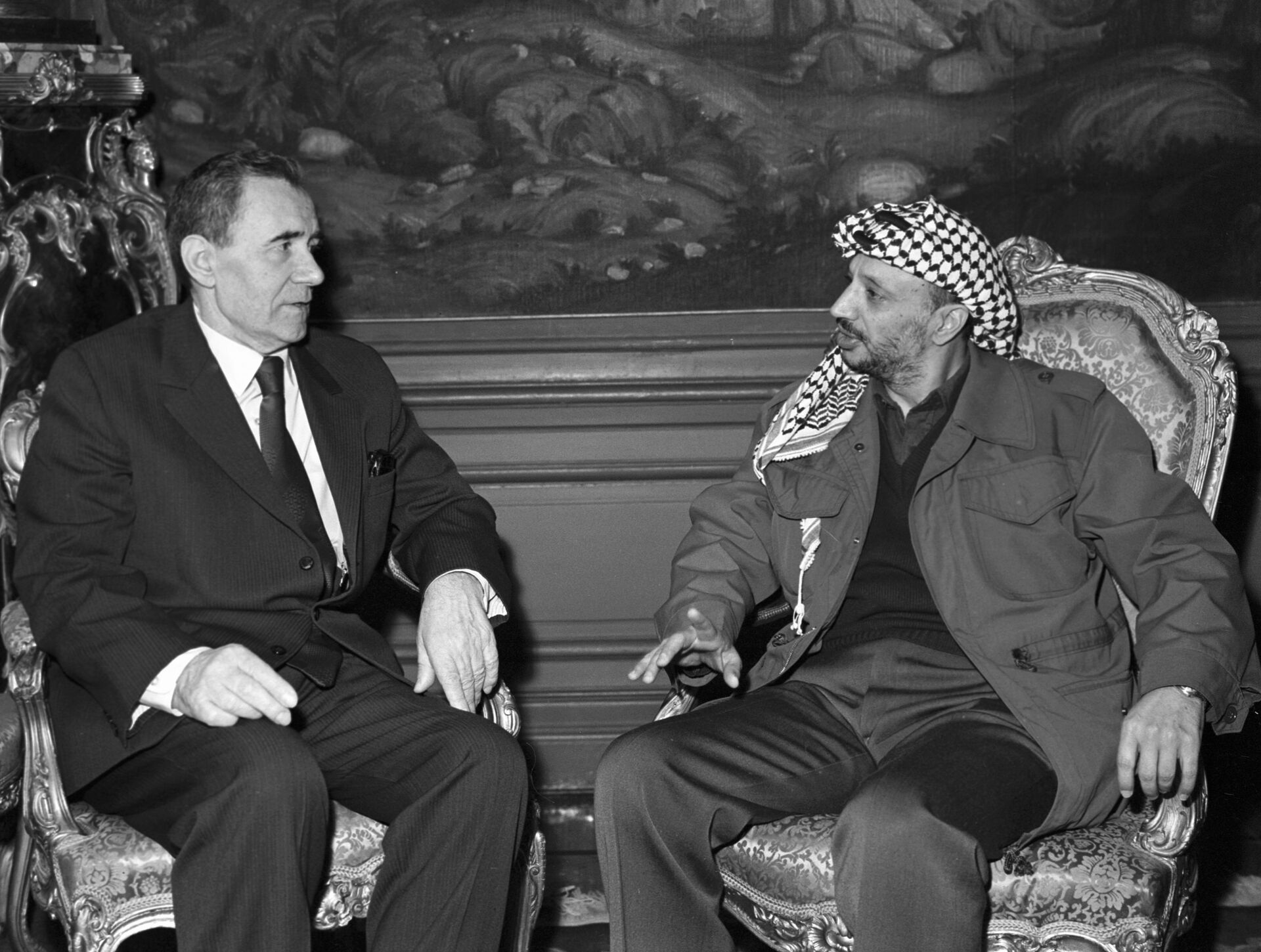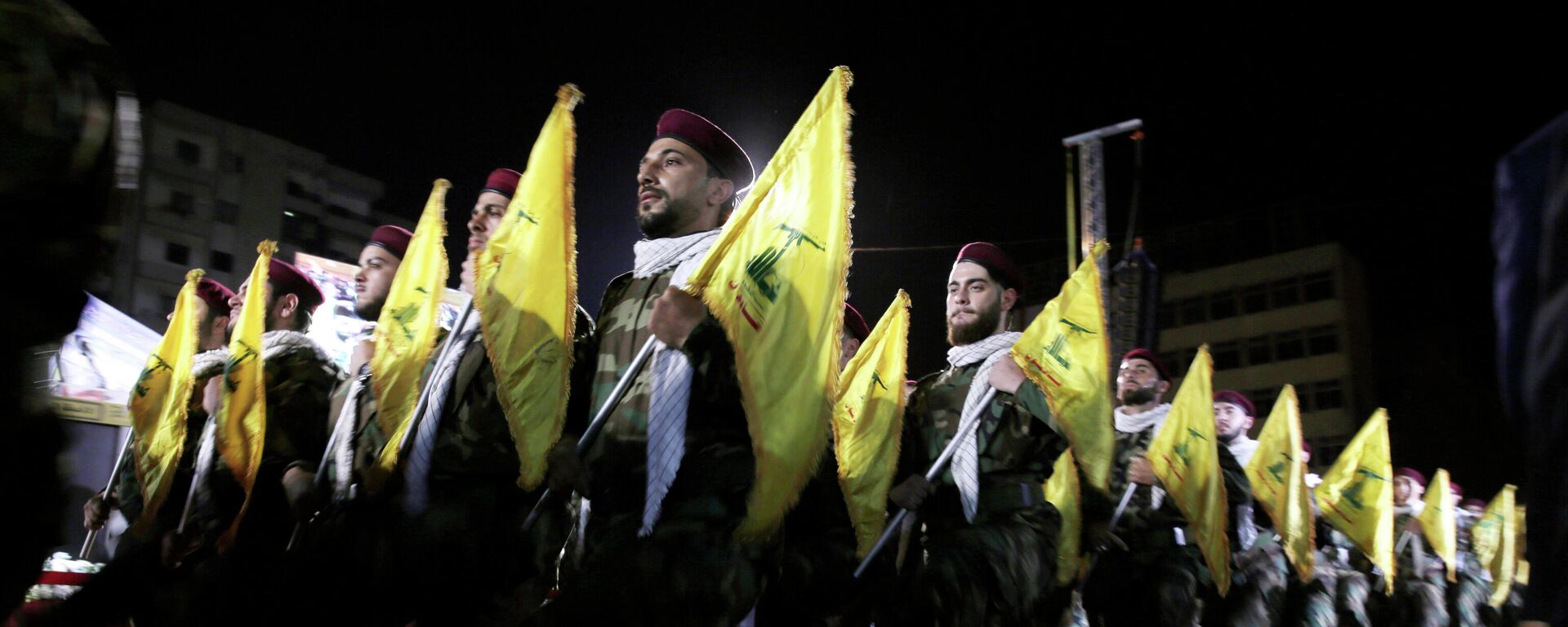Who Are Israel's Neighbors and How Do They Solve Territorial Disputes?
17:14 GMT 13.10.2023 (Updated: 10:27 GMT 30.01.2024)
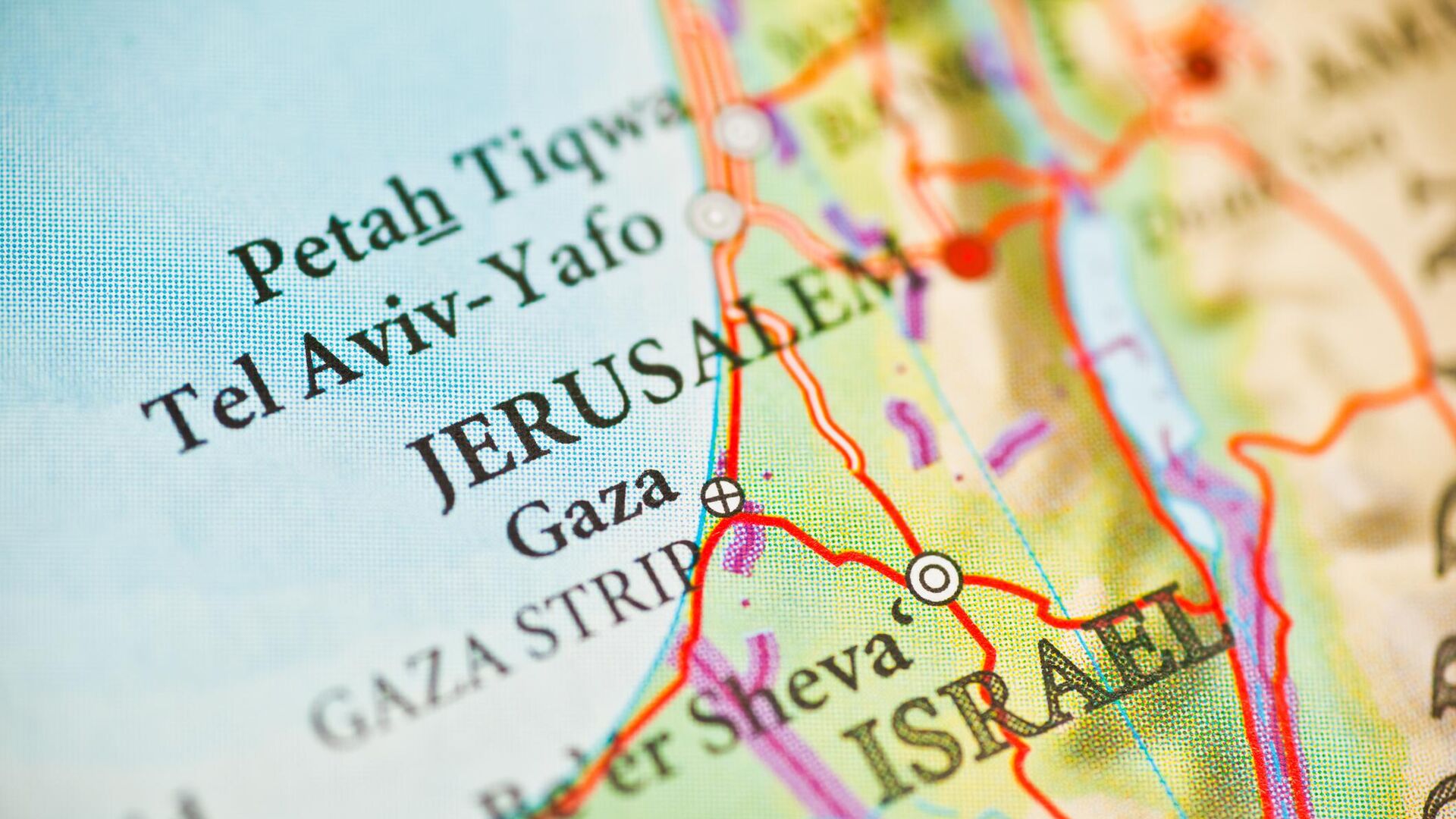
© iStock.com / Pawel.gaul
Subscribe
Over 75 years of its existence Israel has endured several wars with its neighbors and emerged as an influential Middle Eastern power. What territorial disputes has Israel managed to solve so far and what has yet remained to be settled?
The ongoing war between Israel and Hamas, a Palestinian militant group, coincided with the 50th anniversary of the 1973 Yom Kippur War, or the Fourth Arab–Israeli War, in which Syria and Egypt sought to regain territories lost in the previous conflict with the Jewish state.
Since inception, Israel had fought for its right to exist engaging in wars and territorial disputes with its Arab neighbors – Syria, Egypt, Jordan, Lebanon and Palestinians. Recently, some of those disputes have been resolved opening the door to the Abraham Accords of 2020 which saw a number of Muslim states diplomatically recognizing Israel.
Arab-Israel Wars: How Jewish State Took Shape
The Arab-Israel confrontations started at the very beginning of the history of the Jewish state. On November 29, 1947, the UN General Assembly passed a resolution calling for Palestine to be partitioned between Arabs and Jews with 33 to 13 votes and 10 abstentions. The Jews in Palestine accepted the UNGA decision while the region's Arab residents and Arab delegations rejected it. The plan was not implemented and no Palestinian Arab state was founded.
The Arab demarche wasn't something completely unforeseen given that during the September 1947 debate on a two-state solution the Arab Higher Committee (AHC) consisting of representatives of leading Palestinian Arab clans argued that the Jewish people had no whatsoever legal or moral right for establishing their state in the region. The AHC proposed creating a single Arab State in the whole territory of Palestine, adding that the rights of minorities, including Jews, would be respected.
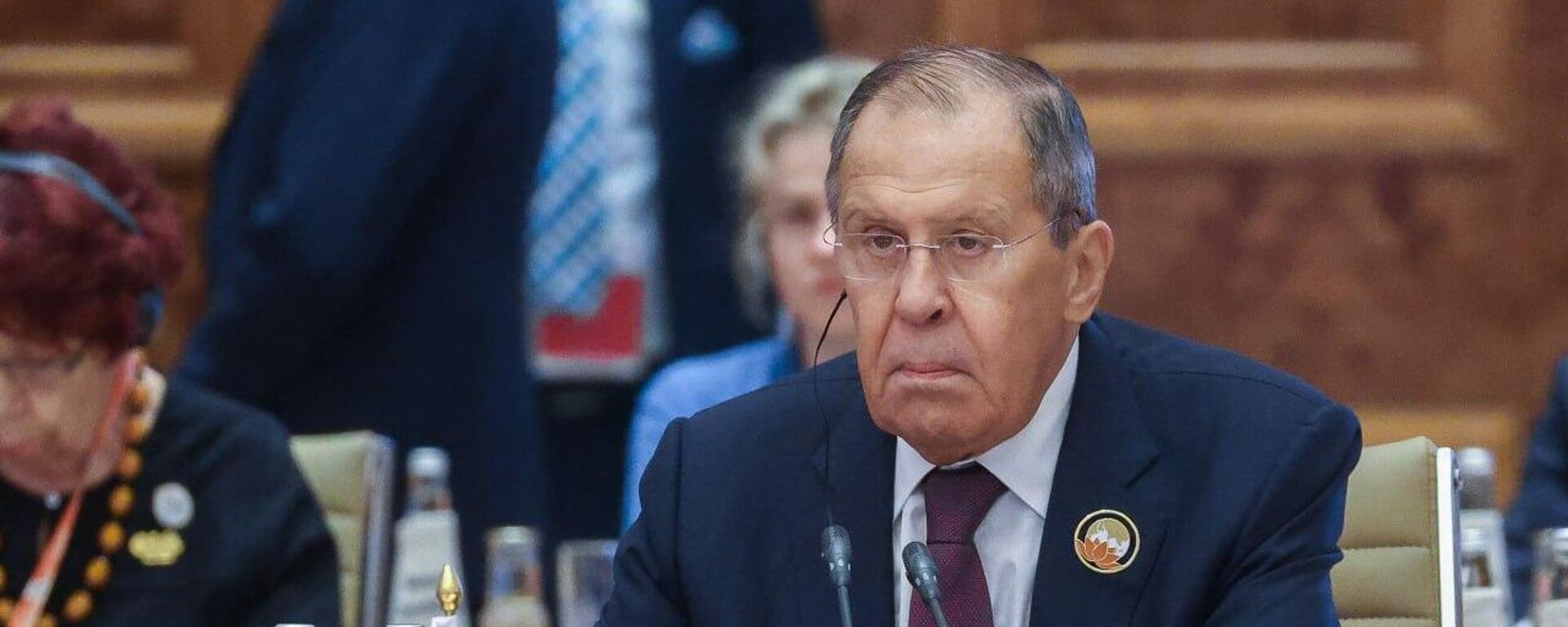
12 October 2023, 07:25 GMT
On May 14, 1948, Head of the Jewish Agency David Ben-Gurion announced the establishment of the State of Israel that was quickly recognized by both the United States and the Soviet Union. However, within a few days Egypt, Iraq, Lebanon, Syria, and Jordan attacked a newly established state in a bid to support the Palestinian cause.
In the aftermath of the fierce war, Israel managed to expand its initial territory to 77% of the former British Palestine mandate, while Jordan occupied the West Bank, the Egyptians took Gaza, and Syria fortified its Golan Heights to target Israeli territories.
During the 1967 Six Day War – which was preceded by Syrian air raids on Israeli villages and Egypt's expulsion of UN peacekeepers from the Sinai Peninsula – the Jewish military managed to expell the Syrian forces out of the strategically important Golan Heights, take the Gaza Strip and the Sinai Peninsula from Egypt, and take the West Bank from Jordan. On top of that, Israel gained full control of Jerusalem.

A platoon of Israeli armoured cars is seen moving through the southern Sinai, Egypt, during Israel's invasion of the Sinai in the six day war of Israel, June 7, 1967
© AP Photo
In the aftermath of the conflict the UN called on warring parties to give up belligerence and cited the necessity to solve the refugee problem, given that the Arab-Israeli hostilities led to the displacement of Palestinians. According to some estimates the Six Day War alone led to the exodus of half a million of civilians.
On October 6, 1973, Syria and Egypt simultaneously attacked Israel in what is now known as Yom Kippur War. The Arab states did not manage to return lost territories or make any territorial gains, but the conflict is believed by some historians to be a key point after which warring parties started to seek compromise solutions in order to get out of the vicious cycle of violence.

Israel Defense Forces Magach main battle tanks, upgraded version of the American M60 Patton, crossing the Sinai towards the Suez Canal during the Yom Kippur War, October 1973
© Israeli Government Press Office
How Israel-Arab Peace Process Started
The international community closely watched the drama unfolding in Palestine. The UN Resolution 242 (November 1967), urged Israel to withdraw "from the occupied territories," and called on Arabs to recognize Israel's right to exist and live in peace with it.
Egypt became the first state to lend a sympathetic ear to the UN Security Council's call. Besides that, the Northern African state wanted its Sinai Peninsula back. Eventually, Egyptian President Anwar Sadat and Israeli Prime Minister Menachem Begin signed the Camp David Accords, brokered by the US, on September 17, 1978.
Under the "Framework for Peace in the Middle East," the sides agreed to ensure a process for Palestinian self-government in the West Bank and Gaza and create a framework for peace treaties between Israel and its other neighbors. In March 1979, Israel and Egypt inked a peace treaty, which led to Israel's withdrawal from Sinai, and Cairo's opening the Suez Canal to Israeli ships.
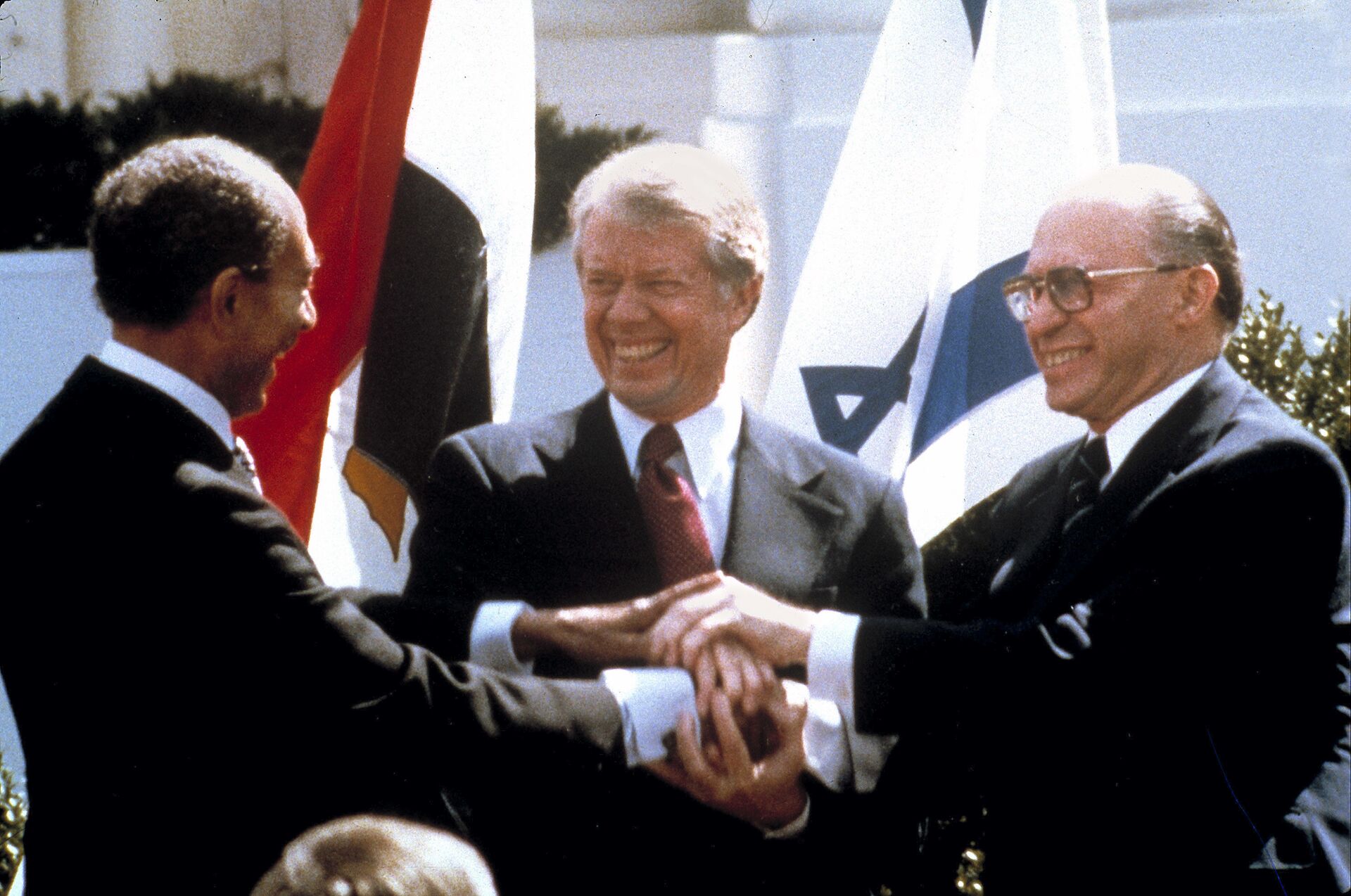
In this file photo taken March 26, 1979, Egyptian President Anwar Sadat,left, U.S. President Jimmy Carter, center, and Israeli Prime Minister Menachem Begin clasp hands on the north lawn of the White House as they completed signing of the peace treaty between Egypt and Israel. When Israeli Prime Minister Menachem Begin shook hands with Egyptian President Anwar Sadat on the White House lawn on March 26, 1979, ordinary Israelis saw not only an end to war with their largest neighbor but also the hope of warm relations with the people next door
© AP Photo / BOB DAUGHERTY
Even though Egypt was immediately ostracized by other Arab states for striking a peace deal with Israel, the move became a watershed in Arab-Israeli relations.
Still, in 1982 Israel again found itself in a war with an Arab state, just six weeks after its withdrawal from the Sinai. Tel Aviv started a war with Lebanon where the Palestinian Liberation Organization (PLO) resided at the time. Founded in 1964, the PLO called for "an end to the State of Israel, a return of Palestinians to their homeland, and the establishment of a single democratic state throughout Palestine". Having expelled the PLO from Lebanon in 1982 in the wake of the Beirut siege, the Israeli military withdrew from the country in 1985 and completed the pull-out by 2000.
Two years later, in 1987 secret negotiations on a peace treaty started between Israel and Jordan; in 1988, Amman renounced its claims to the Israeli-controlled West Bank.
On October 26, 1994, Jordan and Israel signed the peace treaty. To some extent the agreement's conclusion was facilitated by the Oslo Accords of 1973 which created the preconditions for the creation of the independent Palestinian state. The 1973 deal became a breakthrough for Israelis and Palestinian, as the Palestinian Liberation Organization (PLO) recognized Israel; and Tel Aviv stopped considering the PLO a terrorist entity.
The Palestinian Authority was created in 1994 with the PLO as the "representative of the Palestinian people." In 1996, Palestinians held their first elections. Yasser Arafat was elected as the president of the Palestinian Authority.
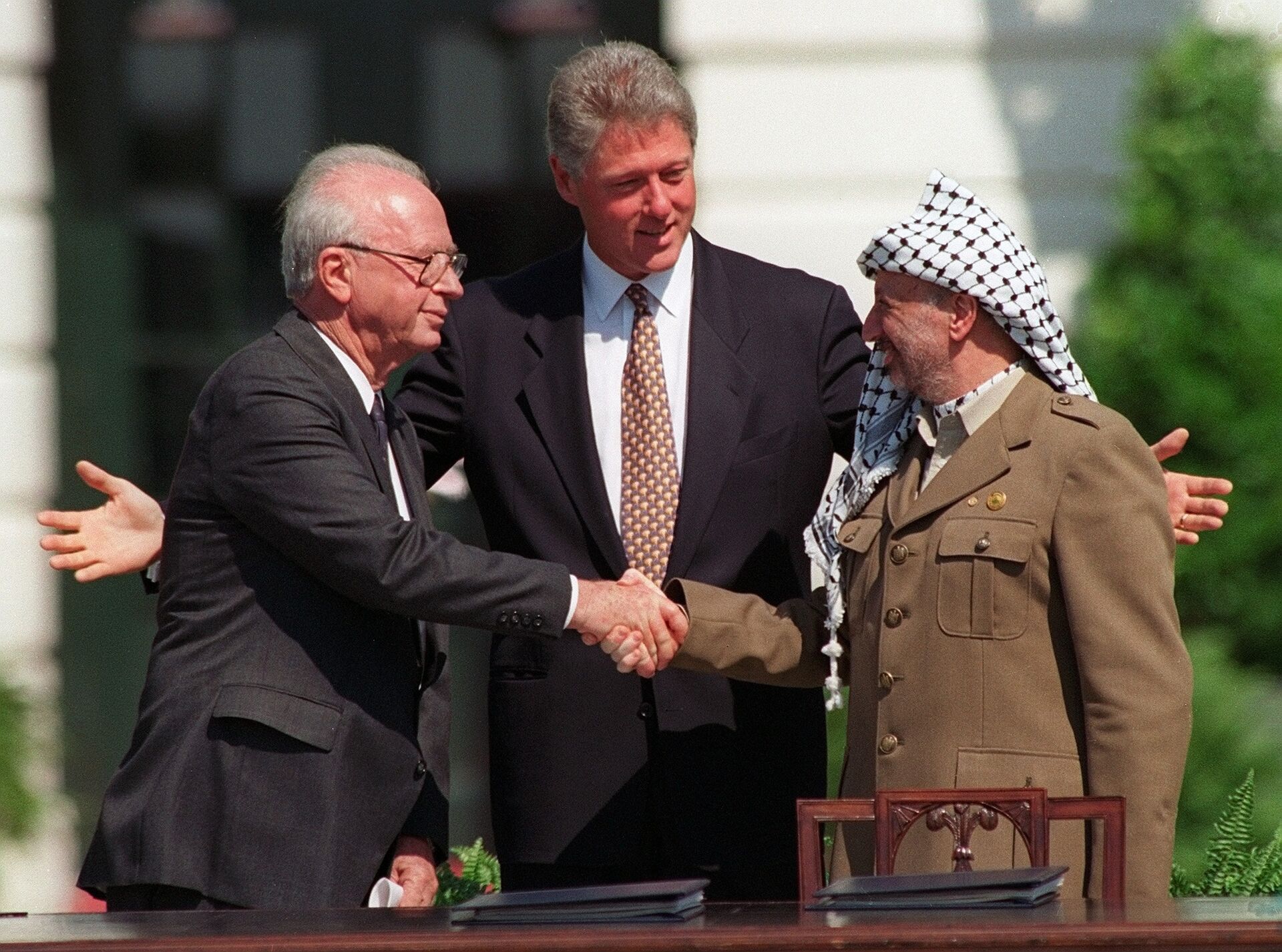
President Bill Clinton presides over ceremonies marking the signing of the 1993 peace accord between Israel and the Palestinians on the White House lawn with Israeli Prime Minister Yitzhak Rabin, left, and PLO chairman Yasser Arafat, right
© AP Photo / Ron Edmonds
Israel Has Yet to Solve Territorial Dilemmas
However, the Arab-Israeli peace process has proven to be a bumpy road.
In 2000, Israel and Lebanon agreed on a demarcation line between their countries, known as the Blue Line, while in 2006, Tel Aviv was dragged into the Second Lebanon war (which lasted for 34 days) by Hezbollah, a Lebanese Shiite militant organization.
The legacy of the 2006 hostilities is a border dispute between Israel and Lebanon over Al-Ghajar, a village near the Golan Heights and Shebaa Farms where Hezbollah tents are deployed.
Similarly, tensions are still simmering over the Golan Heights, a territory seized by Israel during the Six Day War from Syria. Israel and Syria have technically been in a state of war since 1948.
Another open wound is the continuous territorial dispute with the Palestinian Authority. Under the two-state solution, Eastern Jerusalem, the Western Bank and the Gaza Strip had to comprise an independent Palestinian state. In 2005 Israel withdrew from the Gaza Strip.
However, the process saw a potential setback during President Donald Trump's tenure. While brokering historic Abraham accords under which the United Arab Emirates (UAE), Bahrain, Sudan, and Morocco normalized relations with the Israeli State, the Trump administration at the same time threw the Israeli-Palestinian peace process (as well as Israel-Syria peace settlement) into question by recognizing Jerusalem as Israeli capital, approving of Israel's presence in the West Bank and naming Golan Heights as a Jewish state territory, per Mideast observers.
Moscow sees the root cause of the current strife between Israel and Hamas in the failure of the international community to secure the creation of a Palestinian state in accordance with the related UN resolutions.
According to Russian President Vladimir Putin, the US government actively sought to "monopolize" the resolution of the Israeli-Palestinian conflict but instead of seeking a compromise, pushed their own vision.
"Unfortunately, we see a sharp escalation of the situation in the Middle East. I think that many will agree with me that this is a clear example of the failure of the policy of the United States in the Middle East, which tried to monopolize the settlement, but, unfortunately, was not concerned with finding compromises acceptable to both sides, but, on the contrary, promoted its own ideas about how it should be done," Putin stated earlier this week, as the Gaza crisis evolved.
On October 13, the Russian President made it clear that Moscow is ready to help mediate the conflict to prevent further bloodshed in Gaza.
"Collective efforts are more than needed in the interests of an early ceasefire and stabilization of the situation on the ground. I would like to emphasize that Russia is ready to coordinate with all constructively minded partners. We proceed from the belief that there is no alternative to resolving the Palestinian-Israeli conflict through negotiations," Putin emphasized on Friday.

